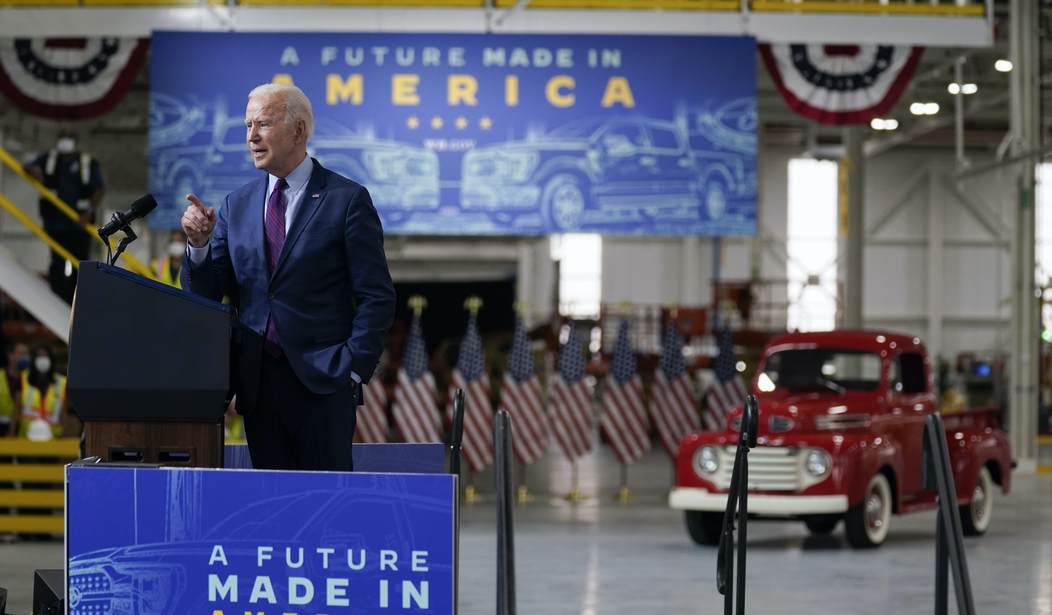You hate to see it...okay. I'm lying through my teeth.
I expected to see it, and seeing it on a major news network makes it all the more satisfying.
Not my headline, y'all. It's CNBC's.
EV euphoria is dead. Automakers are scaling back or delaying their electric vehicle plans
"Dead." How about that?
The buzz around electric vehicles is wearing off.
For years, the automotive industry has been in a state of EV euphoria. Automakers trotted out optimistic sales forecasts for electric models and announced ambitious targets for EV growth. Wall Street boosted valuations for legacy automakers and startup entrants alike, based in part on their visions for an EV future.
Now the hype is dwindling, and companies are again cheering consumer choice. Automakers from Ford Motor and General Motors to Mercedes-Benz, Volkswagen, Jaguar Land Rover and Aston Martin are scaling back or delaying their electric vehicle plans.
Even U.S. EV leader Tesla, which is estimated to have accounted for 55% of EV sales in the country in 2023, is bracing for what “may be a notably lower” rate of growth, CEO Elon Musk said in late January.
That's not to say EV sales aren't going to increase - they are. Sales just aren't going to keep exploding because they've been shoved down our throats. The consumer has spoken.
...“What we saw in ’21 and ’22 was a temporary market spike where the demand for EVs really took off,” said Marin Gjaja, chief operating officer for Ford’s EV unit, during a recent interview with CNBC. “It’s still growing but not nearly at the rate we thought it might have in ’21, ’22.”
Regardless of whatever cash Biden and other countries throw at consumers with subsidies and incentives, people have made their choices pretty clear. It's a small minority interested in EVs and for whom that vehicle works great. More power to them.
The more people learn about EVs, the better decisions they can make about whether an electric is the car for them. In most instances, that decision is a "no." But that doesn't preclude electrics completely - hybrids are doing well, and manufacturers are beginning to ramp up offering what seems to be a really good compromise.
...GM, which was the first traditional automaker to go all in on EVs, plans to roll out plug-in hybrid electric vehicles for consumers alongside EVs and gas cars. Others, such as Hyundai Motor, Kia, Toyota Motor and, potentially, Volkswagen, plan to offer different levels of electrification across their lineups.
“I think the balanced approach is the best way,” VW of America CEO Pablo Di Si told CNBC last month, adding he is in discussions to bring hybrid vehicles to the U.S. The automaker currently sells hybrid vehicles in Europe, but none stateside.
There is also the problem of affordability as far as EVs on the market go. Consumers look to resale or trade-in values, as well as comparables for repairs, when getting ready to commit to what is now a hefty budget buster of a purchase. EVs are still on the expensive side of the ledger and EV stocks reflect the challenges facing the category.
It's safe to say the EV narrative is dead at this point pic.twitter.com/Q0PqXas3kp
— Stocktwits (@Stocktwits) March 13, 2024
The vehicles have also been in common use long enough now that real-time data can be collated, and this data is not always friendly to the EV narrative advocates are selling.
University of British Columbia did a study on the break-even point of ICE vehicles vs EVs, usage wise.
— Kirk Lubimov (@KirkLubimov) March 13, 2024
Accounting for all ownership costs, you have to own an EV for 7+ years to break-even...if you drive enough kms per day.
The daily km driven to break-even on costs needs to be… pic.twitter.com/vjb8UCihGF
...The daily km driven to break-even on costs needs to be 64km in BC, 88km in Ontario and 181km in Nunavut. The problem is most drivers drive a fraction of the daily km needed to generate savings that makes sense to buy an EV.
That's if the EVs rebates continue, charging costs don't go up, and if the battery lasts 7+ years.
The ironic part of the Liberal's and others' zero emissions vehicle sales mandates is that not only will it be cheaper for most drivers not to own an EV but also might be more environmental.
There's also been a sneaking suspicion that advocates in the climate cult and global governments haven't always been upfront about the benefits of EVs. If you'll remember, this same cult assured us that the Arctic would be free of ice, and all the polar bears would have drowned by now. Science™ said so.
Those suspicions have found some grounds for argument in recent studies—maybe the numbers were fudged to advance the narrative
It is all beginning to look a bit like the Volkswagen scandal: you remember, when regulators caught out the German car company for installing software which detected when diesel engines were in test mode and adjusted performance so that it flattered emissions figures.
A test by What Car magazine has revealed that the official figures for the range of electric cars over-estimates their real-life range by around a third. Vehicles were driven around a test track in Bedfordshire until they ran out of juice.
The result? A Lexus UX 300e (official range 273 miles) managed just 170 miles before slowing to a halt – 37.9 per cent less than advertised. A Volkswagen ID7 Pro (official range 383 miles) managed 254 and a Volvo XC40 Recharge (official range 331 miles) managed 252. Moreover, these are all supposedly long-range vehicles which retail at over £50,000 new.
I am no petrol-head. I would much rather have a clean electric vehicle, but sorry, I am still not buying one. Last week I drove up and down to the Scottish Highlands, with a door-to-door distance of 480 miles. With generous stops, it took me 11 hours. It was no problem in my diesel Volvo estate. I didn’t even have to fill up on the way up: the car averaged 59 miles to the gallon, giving it a range of around 700 miles. I simply don’t know how I am supposed to complete such a journey in an electric car, even if I was minded to pay £55,000 for one.
EVs make no sense for the majority of the driving public, and it seems as if that message is only beginning to get through.
...Electric cars are practical as local runabouts, for motorists who have access to off-street parking within reach of an electric socket. But they are still not a practical solution for most of us. Nor are they likely to become so in the near future. If we plastered the country with rapid chargers it would blow out the grid. As the chief of Toyota recently pointed out, Western governments have been trying to push for a complete transition to electric vehicles in ignorance of the fact that many parts of the world do not have effective electricity grids.
Last week, Rivian announced they were canceling plans to build a new $5B facility in Georgia and would utilize their existing Illinois plant for new models, saving a substantial chunk of change in the bargain. It's a prudent move, particularly in light of a cooling market.
Many people who buy electric vehicles do so for environmental reasons. But they might not be so thrilled about having an EV manufacturing site near their home.
Yesterday, Tesla rival Rivian announced that it’s halting plans to build a $5 billion factory in Georgia. Instead, it will manufacture its upcoming R2 and R3 models at its existing plant in Illinois, allowing it to save more than $2.25 billion in capital expenditures.
While the politicians who lured Rivian with tax incentives might be disappointed—the company pledged to create 7,500 jobs by the end of 2028—some Georgia residents living near the planned facility breathed a sigh of relief, for now at least.
Meanwhile, Elon Musk's Tesla, still the industry leader, took a billion-dollar hit when a group of lunatic eco-terrorists in Germany set fire to transformers, shutting down the company's massive Gigafactory in Grünheide.
Production at Tesla's electric vehicle plant in Germany ground to a halt and workers were evacuated early Tuesday due to a power failure caused by suspected arson, drawing condemnation from Tesla CEO Elon Musk.
Andre Thierig, who manages 12,500 staff at the Grünheide Gigafactory, near Berlin, said it would take several days before production would be back up and running. He said the outage would cost "in the high nine-digit euro range," meaning more than $100 million.
The incident at Tesla's first European factory poses another setback for the company, which is facing pressure from a German metalworkers union and global supply chain issues because of attacks on shipping in the Red Sea.
Speaking to reporters on Tuesday afternoon, Thierig said, "We are very concerned about the safety of our employees," adding, though, that the outage "had not posed any danger to people or the environment."
Not a good week at all.
Biden is trying to keep pressure on US automakers with an absolutely crippling CAFE standards revision that's due to be finalized soon. The effect would be even worse when Americans aren't buying the expensive and impractical EVs POTATUS is trying to force them to. For all his bluster and the dictatorial nature of his departments, even the European standards they are so desperate to meet are falling by the wayside due to a conservative surge rising there.
...Proposals currently under review by the Biden administration to hike fuel economy standards through 2032 could cost automakers more than $14 billion in fines based on the fuel efficiencies of their current fleets, according to the Alliance for Automotive Innovation, which represents the largest automakers operating in the U.S.
...A separate letter to federal regulators last year by the American Automotive Policy Council estimated such regulations would cost GM $6.5 billion in fines and Jeep parent Stellantis $3 billion. The council, which represents the Detroit automakers, said Ford’s penalties would total about $1 billion.
...Automakers’ fuel economies are based on a fleetwide mix of vehicles sold. The better fuel economy and fewer emissions a vehicle produces, the better it is for the automaker’s overall score.
“It all depends on what the final regulation looks like,” said Matt Blunt, president of the American Automotive Policy Council.
...Looming in the distance, too, is the U.S. presidential election in November. If former President Donald Trump is reelected, he’s expected to scale back or remove the fuel economy mandates, as he did during his first term in office.
God willing, these proposed revisions could well be permanently unplugged if a certain anti-regulation candidate takes the presidency again in November.








Join the conversation as a VIP Member